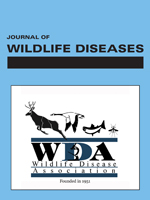Bovine tuberculosis (BTB) was first detected in Kruger National Park (KNP) in a single African buffalo (Syncerus caffer) in 1990. In 1991/1992, 2,071 African buffalo were examined for BTB as part of a culling program that removed animals from all known herds in KNP. The prevalence of BTB in 1991/1992 was estimated to be 0%, 4.4% (±0.6%), and 27.1% (±1.4%), in the north, central, and south zones of KNP, respectively. In 1998, a stratified, two-stage cluster sampling method was used to estimate that the prevalence of BTB was 1.5% (±2.5%), 16% (±5.3%), and 38.2% (±6.3%), in the north, central, and south zones, respectively. This represented a significant increase in prevalence (P ≤ 0.05) in the south and central zones, but not in the north zone. Continued monitoring of BTB in KNP is important for understanding disease transmission risks, potential population effects, and the efficacy of disease management strategies. The methodology and sample sizes used in 1998 are appropriate for future BTB monitoring in KNP.
How to translate text using browser tools
1 April 2001
PREVALENCE OF BOVINE TUBERCULOSIS IN AFRICAN BUFFALO AT KRUGER NATIONAL PARK
Timothy C. Rodwell,
Nick P. Kriek,
Roy G. Bengis,
Ian J. Whyte,
Petri C. Viljoen,
Valerius de Vos,
Walter M. Boyce

Journal of Wildlife Diseases
Vol. 37 • No. 2
April 2001
Vol. 37 • No. 2
April 2001
African buffalo
bovine tuberculosis
cluster sampling
disease monitoring
Mycobacterium bovis
Syncerus caffer




